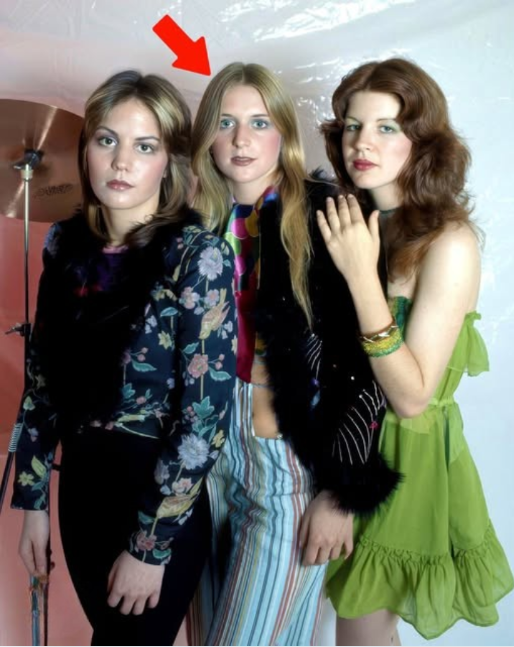At the heart of the 1970s rock revolution was a teenager with boundless energy, a raw talent behind the drum kit, and a vision to defy expectations. Her name was Sandy West—a musician who helped redefine what it meant to be a female rock star. As the co‑founder and original drummer of The Runaways, Sandy blazed a trail through a male-only industry. Though she passed away far too young, at just 47, her legacy continues to resonate with countless musicians and fans around the world.

Early Beats: From Long Beach to the Limelight
Born Sandra Sue Pesavento on July 10, 1959, in Long Beach, California, Sandy was surrounded by Southern California sunshine, surf culture, and music from an early age. Her grandfather gifted her a drum kit when she was just nine years old—and she never looked back. By age 13, she was the only girl playing publicly with local teen bands, demonstrating both tenacity and flair in an environment dominated by boys.
Two years later, Sandy crossed paths with music icon Joan Jett and visionary producer Kim Fowley, and together they formed The Runaways in 1975. Comprising Joan Jett (guitar/vocals), Sandy West (drums/vocals), Cherie Currie (vocals), Lita Ford (lead guitar), and Jackie Fox (bass), the band set out to prove that teenage girls could rock just as fiercely—if not more—than their male counterparts
Runaways Rising: A Sound Like No Other
With hits like “Cherry Bomb,” “Born to Be Bad,” and Queens of Noise, The Runaways quickly earned international acclaim. In Japan, in particular, they became superstars—selling out arenas, achieving gold records, and igniting arenas with their swagger and spirit
Though American critics sometimes dismissed them as mere teen provocateurs, Time would later hail Sandy West as a “pioneering rock drummer whose muscular riffs propelled the punk-metal sound of the Runaways” . The Guardian called her drumming the driving force behind the band’s sound ─ later crediting their influence on punk and Riot Grrrl movements to her unmatched energy
Sandy’s style wasn’t about flash—it was about power. Joan Jett remarked that Sandy was “of the calibre of John Bonham,” legendary drummer of Led Zeppelin, and mourned her loss deeply: “I always told her we changed the world.” Cherie Currie later added: “Sandy West was by far, the greatest female drummer in the history of rock and roll… most important was her heart.”

Life After the Runaways: Solo Struggles and Survival
When The Runaways disbanded in 1979, Sandy was only 19—and at a crossroads. She formed The Sandy West Band, recorded a solo EP titled The Beat Is Back, and performed locally in Southern California. Despite her immense talent, commercial success remained elusive. To make ends meet, she took on various jobs—including working in construction, bartending, and even as a veterinary assistant
Yet even amid financial hardship, Sandy never completely stepped away from music. She reunited occasionally with Cherie Currie and others for live performances and contributed to the documentary Edgeplay: A Film About the Runaways (2004), where she candidly reflected on her life and the band’s turbulent history

A Courageous Battle and a Lasting Legacy
In 2005, Sandy was diagnosed with small-cell lung cancer, which later spread to her brain. Despite treatments, the disease progressed rapidly. On October 21, 2006, she passed away in San Dimas, California, at the age of 47
Following her death, tributes poured in from fans, celebrities, and the music community. Joan Jett and Lita Ford both paid emotional tributes, recognizing Sandy’s raw talent, enduring friendship, and revolutionary spirit
A memorial concert was held in December 2006 at The Knitting Factory in Hollywood, featuring performances by Cherie Currie, The Bangles, The Donnas, the Sandy West Band, as well as drum duets with legends like Carmine and Vinnie Appice—the event served both as a celebration of her life and the launch of the Sandy West Foundation
In 2009, the city of Dana Point, California, dedicated a statue in her honor: a chainsaw-sculpted mermaid playing guitar, accompanied by a base inlaid with her drumsticks. The memorial became a gathering spot for friends, family, and fans who wanted to honor her memory

Why Sandy West Still Matters
-
Inspiration to Female Musicians: Sandy’s presence behind the kit proved to a generation that women could not just participate in rock music—they could spearhead it.
-
Unfiltered Authenticity: She never compromised her artistry or persona for fame. Her refusal to soften her style or image earned her both criticism and admiration.
-
Musical Legacy: Today, bands from L7 to Bikini Kill and beyond cite The Runaways—as well as Sandy’s drumming style—as major influences on the riot grrrl and punk movements of the 1990s
Time Magazine described her as a “muscular” drummer who propelled a sound that combined punk’s relentless energy with metal’s power Wikipedia. Her style also created a template for female musicians to follow—not just as accessories to male-led bands, but as leaders in their own right.

Closing Beat: A Heartbeat That Lives On
Though Sandy’s life was cut tragically short, her spirit and music continue to resonate. The Runaways’ music remains revered and her personal story of courage, creativity, and resilience continues to inspire.
In her own words, from Edgeplay: “How many teenage girls get to do what we did in a lifetime?” It was a rhetorical question—the kind that reveals the rare magic of her life: blazing bright, unapologetically bold, and unforgettable.
Sandy West wasn’t just a drummer. She was a force of nature. And her beat will never stop.